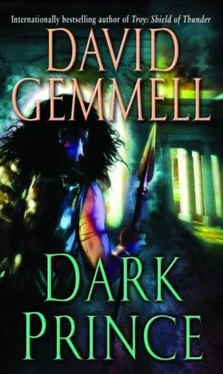'I would expect you to take that view,' said Mothac, his face crimson.
'I am sorry, my friend, what else can I say?' asked Parmenion, approaching the old man and laying his hand on Mothac's broad shoulder. But the Theban shrugged it away.
'There are some matters better left undiscussed,' muttered Mothac. 'Let us continue with other problems.' He scooped up his papers and began to leaf through them. Then he stopped, his bald head sagging forward, and Parmenion saw there were tears in his eyes.
'What is it? What's wrong?' Parmenion asked, moving to sit alongside him.
'They are all going to die,' said Mothac, his voice shaking.
'Who? Who is going to die?'
'The young men of my city. They will rise, swords in their hands. And they will be cut down.'
Understanding flowed into Parmenion's mind. 'You have been helping them to organize?'
The old man nodded. 'It is my city.'
'You know when they plan to attack the Cadmea?'
'No, but it will be soon.'
'It need not end in bloodshed, Mothac. I will send another two regiments into Boeotia and that will give them pause.
But promise me you will sever your connections with the rebels. Promise me!'
'I cannot promise that! You understand? Everything I do here makes me a traitor. Ever since Chaironeia, when you crushed the Theban army. I should have left you then. I should have gone home. Now I will!'
'No,' said Parmenion, 'don't leave. You are my oldest friend and I need you.'
'You don't need me,' said the old man sadly. 'You don't need anything. You are the strategos , the Death of Nations. I am getting old, Parmenion. I shall go home to Thebes. I will die in the city of my birth and be buried alongside my love.'
Mothac rose and walked, stiff-backed, from the room.
City of Aigai, Midwinter 337 BC
They had many names and many uses, but to Aida they were the Whisperers . The Persians had worshipped them as minor demons or daevas; the ancient peoples of Akkady and Atlantis believed them to be the souls of those who had died evil. Even the Greeks knew them, in a corrupted form, as Harpies.
Now they gathered around Aida like small wisps of mist, barely sentient but pulsing with dark emotions, exuding the detritus of evil, despair, melancholy, gloom, mistrust, jealousy and hatred.
The cellar was colder than the heart of a winter lake, but Aida steeled herself against it, sitting at the centre as the smoky forms hovered about her.
The house was set apart from the city, a former country home for a minor Macedonian noble who had died in the Thracian wars. Aida had purchased it from his widow, for it had a number of advantages. Not only was it secluded but there was a garden hidden behind a high wall where her acolytes could dispose of the bodies of the sacrifices -
those unfortunates whose blood had been needed to keep the Whisperers strong.
She reached out her hand, summoning the first of the ghostly shapes. It flowed over her fingers and immediately images formed in her mind. She saw Philip slumped on his throne, his thoughts dark and melancholy, and she laughed aloud. How simple it was to twist the minds of men! Summoning a second form, she watched Attalus plotting and scheming.
One by one she received her image reports before sending the Whisperers back to their human hosts. Then, at last, the cold began to seep into her bones and she rose and left the room, climbing the dark stairs that led to the lower gardens.
All was well and Aida was deeply satisfied. Soon Philip would face his doom, and the Lady of Samothrace would be on hand to guide his son to the throne. Such a handsome boy! Oh, how she would aid him, supplying such joys and then, while he was asleep, she would remove the necklet and open the gates of his soul.
Aida shivered with exquisite pleasure. All her life she had dreamed of this coming day, as had her mother before her.
Her mother's hopes — and worse, her spirit and her will to live — had been crushed by Tamis. But there is no one now to thwart me, she thought.
Soon Philip of Macedon would be dead, slain in his palace while he slept.
Arousal stirred in her and she summoned two of her guards. Mostly she found the touch of men distasteful, but on occasions such as this there was a satisfaction in using them that bordered on pleasure. It was always heightened when she knew her lovers were about to die. As their youth and strength was expended on her, she gloried in their coming demise.
The two men were handsome and tall, mercenaries from Asia Minor. They smiled as they approached her and began to remove their clothing.
The first reached her, arrogantly laying his hand on her breast, pulling clear the dark robe she wore.
Tomorrow, she thought, your soul will be shrieking on its way to Hades…
Philip was drunk and in high good humour. Around him were his friends and generals — twenty men who had served the King well over the last two decades — and they were celebrating the last night of the wedding festival. Philip leaned back in his chair, his gaze moving from man to man.
Parmenion, Antipater, Cleitus, Attalus, Theoparlis, Coenus. . men to march the mountains with. Strong, loyal, fearless. A movement at the far end of the table caught his eye. Alexander was smiling at some jest made by the youngster, Ptolemy.
Philip's good humour evaporated. The joke was probably about him.
But he shrugged the thought away. Tonight was a celebration and nothing would be allowed to mar it.
Servants cleared away the last of the food plates and jugglers came forward to entertain the King. They were Medes, with curled beards and flowing clothes of silk and satin. Each of the three carried six swords which they began to hurl into the air, one by one, until it seemed that the blades were alive, spinning and gleaming like metal birds above the throwers. The Medes moved apart and now the swords sliced through the air between them, scarcely seeming to touch the hands of the throwers so fast did they move. Philip was fascinated by the skill and wondered, idly, if the men were as talented when it came to using the blades in battle. According to Mothac's reports the Persian king had 3,000 Medean warriors in his army.
At last the display finished and Philip led the cheers. Several of Alexander's companions clapped their hands, which made the King frown. It was becoming the custom to show appreciation by slapping the palms together, but for centuries such clapping had been considered an insult. It had originated in the theatre, used by the crowd to drown out bad actors and forcing them to leave the stage. Then the Athenians began to use clapping at the end of a performance to signify approbation. Philip did not like such changes.
The jugglers were replaced by a knife-thrower of exquisite skill. Seven targets were set up and the man, a slim Thessalian, found the centre of each while blindfolded. Philip rewarded him with a gold coin.
There followed four acrobats, slim Thracian boys, and a saga poet who sang of Heracles and his labours. Through it all Philip's cup was never empty.
Towards midnight several of the older officers, Parmenion among them, asked leave of the King and returned to their homes. But Philip, Attalus, Alexander and a dozen others remained, drinking and talking.
Most were drunk, Philip noted, especially Attalus who rarely consumed alcohol. His pale eyes were bleary, but he was smiling blissfully, which brought a chuckle from the King who clapped him on the shoulder.
'You should drink more often, my friend. You are altogether too solemn.'
'Indeed I should,' Attalus replied, enunciating the words with great care and total concentration. 'It is… an…
Читать дальше












